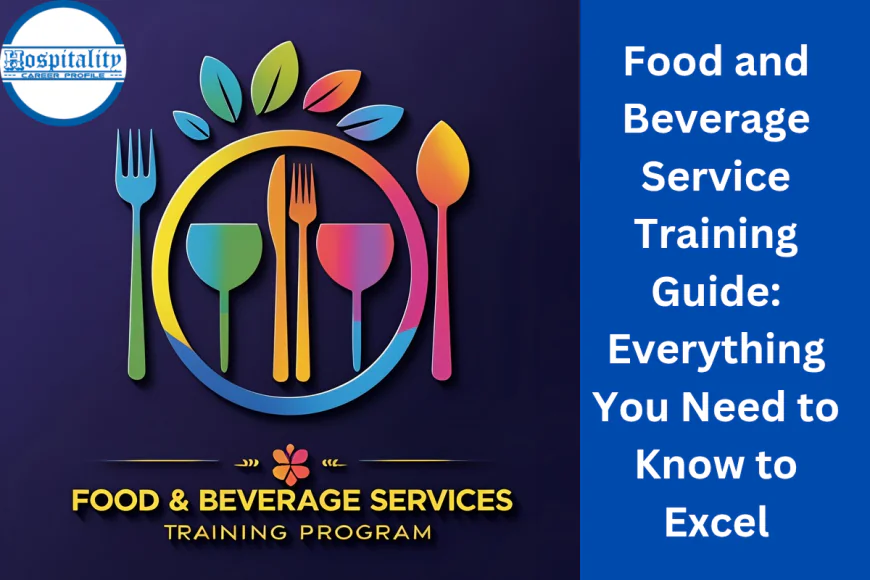Food and Beverage Service Training Guide: Everything You Need to Know to Excel
Learn the essentials of food and beverage service with this complete training guide. Perfect for hotel staff, students, and aspiring hospitality professionals.

Introduction: What is Food and Beverage Service?
Food and Beverage (F&B) Service is one of the most vital departments in the hospitality industry. It covers everything from serving food in restaurants to managing banquet events and room service. F&B service is not just about serving food—it's about creating a memorable experience for guests.
This article is a beginner-to-intermediate level training guide for anyone working or aiming to work in this department.
1. Types of Food and Beverage Services
There are several types of F&B services you’ll encounter:
a. Table Service
This is when a waiter serves the guest at the table. It can be formal (silver service) or informal (American or French service).
b. Buffet Service
Food is placed in a common area where guests serve themselves or are served by chefs behind the counter.
c. Room Service
Food is delivered to a guest’s room in hotels. Timing, presentation, and courtesy are crucial here.
d. Banquet Service
This is pre-planned service for a group of people, usually during conferences, weddings, or other events.
e. Self-Service
Common in cafeterias or quick-service restaurants. Guests collect food from the counter and carry it themselves.
2. Key Responsibilities in the F&B Department
F&B staff must focus on guest satisfaction through top-notch service. Here are the core responsibilities:
Greeting and seating guests
Presenting menus and taking orders
Serving food and beverages professionally
Handling guest complaints politely
Clearing tables and resetting them for the next guest
Coordinating with the kitchen and bar teams
Following hygiene and safety standards
3. Standard Operating Procedures (SOPs)
Every hotel or restaurant has its own SOPs, but the following are standard practices:
Uniform and Grooming: Clean uniform, trimmed nails, neat hair, and no strong perfumes.
Pre-Service Briefing: Attend team meetings to know the day’s menu, VIP guests, and any special events.
Service Steps: Follow the service flow—greeting, order-taking, serving, clearing, and billing.
Hygiene Protocol: Wash hands regularly, sanitize trays and cutlery, and wear gloves when needed.
4. Training Tips for Food and Beverage Staff
To grow in the F&B department, focus on constant improvement. Here are some key training tips:
a. Know Your Menu
Memorize menu items, ingredients, allergens, and pairings with beverages.
b. Improve Communication Skills
Clear, polite, and confident speech can make guests feel at home.
c. Master Serving Techniques
Carry trays properly, pour water and wine smoothly, and serve from the guest’s left or right as per the service type.
d. Learn Upselling
Offer recommendations without being pushy. Suggest wines, desserts, or special items based on the guest’s order.
e. Handle Complaints Gracefully
Listen actively, apologize sincerely, and take action quickly. Escalate to a manager if needed.
5. Guest Etiquette and Body Language
Body language speaks louder than words. Here's how to maintain a professional presence:
Keep eye contact (without staring)
Smile genuinely
Stand straight
Nod when listening
Use polite language (sir/ma’am, please, thank you)
6. Common Challenges in F&B and How to Handle Them
Rush Hours
Stay calm, prioritize tasks, and communicate with the kitchen.
Difficult Guests
Stay professional. Don't argue. Offer solutions and call a supervisor if needed.
Mistakes in Order
Own up quickly, apologize, and replace the item with a smile.
7. Growth Opportunities in F&B Service
F&B service is a career with strong growth if you are passionate and hardworking. Starting as a waiter or steward, one can rise to:
GSA
Captain
Supervisor
Executive
Assistant Manager
Restaurant Manager
Banquet Manager
F&B Manager
Corporate F&B Director
Training, experience, and attitude matter more than anything else.
8. Final Thoughts: Why F&B Service is a Skill for Life
Food and beverage service teaches you discipline, hospitality, people skills, and team management. These skills stay with you forever and open doors worldwide. Whether you're serving tea in a café or managing a 5-star hotel restaurant, your service can leave a lasting impression.
If you're passionate about hospitality, the F&B service department is a great place to start. With the right training and attitude, you can go a long way in this exciting and dynamic field.


